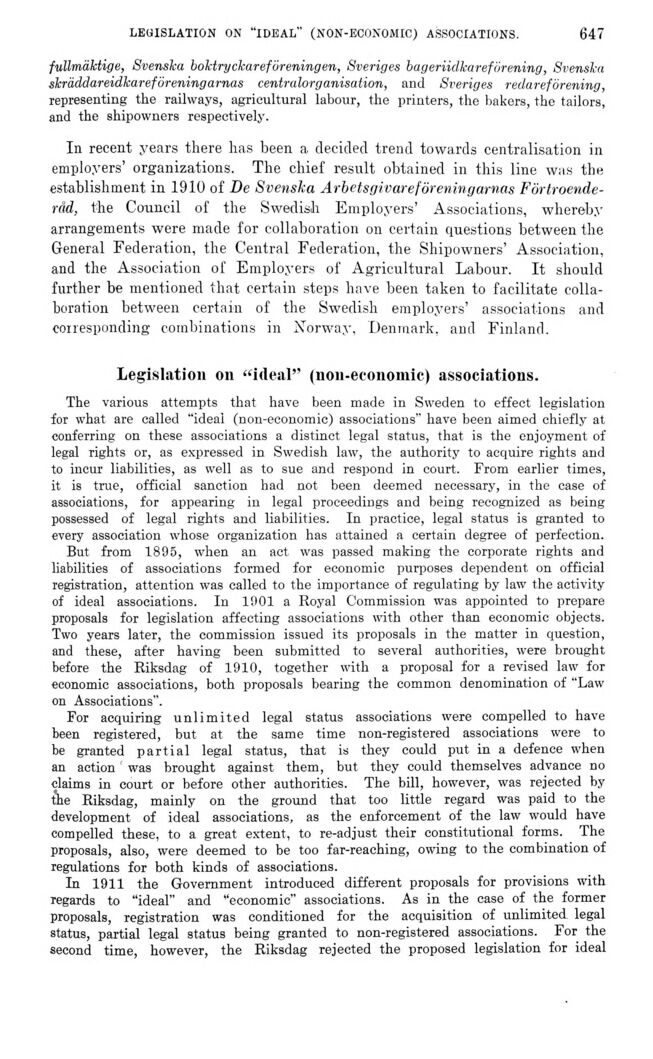
Full resolution (JPEG) - On this page / på denna sida - V. Social Movements - 1. Labour Questions and Social politics - Organization of Workmen and Employers. By O. Järte and B. Nyström - Legislation on "ideal" (non-economic) Associations. By E. Sjöstrand

<< prev. page << föreg. sida << >> nästa sida >> next page >>
Below is the raw OCR text
from the above scanned image.
Do you see an error? Proofread the page now!
Här nedan syns maskintolkade texten från faksimilbilden ovan.
Ser du något fel? Korrekturläs sidan nu!
This page has never been proofread. / Denna sida har aldrig korrekturlästs.
legislation on "ideal" (non-economic) associations.
647
fullmäktige, Svenska boktryckareföreningen, Sveriges bageriidkareförening, Svenska
skräddareidkareföreningarnas centralorganisation, and Sveriges redareförening,
representing the railways, agricultural labour, the printers, the bakers, the tailors,
and the shipowners respectively.
In recent years there has been a decided trend towards centralisation in
employers’ organizations. The chief result obtained in this line was the
establishment in 1910 of Be Svenska Arbetsgivareföreningarnas
Förtroenderåd, the Council of the Swedish Employers’ Associations, whereby
arrangements were made for collaboration on certain questions between the
General Federation, the Central Federation, the Shipowners’ Association,
and the Association of Employers of Agricultural Labour. It should
further be mentioned that certain steps have been taken to facilitate
collaboration between certain of the Swedish employers’ associations and
corresponding combinations in Norway, Denmark, and Finland.
Legislation on "ideal" (non-economic) associations.
The various attempts that have been made in Sweden to effect legislation
for what are called "ideal (non-economic) associations" have been aimed chiefly at
conferring on these associations a distinct legal status, that is the enjoyment of
legal rights or, as expressed in Swedish law, the authority to acquire rights and
to incur liabilities, as well as to sue and respond in court. From earlier times,
it is true, official sanction had not been deemed necessary, in the case of
associations, for appearing in legal proceedings and being recognized as being
possessed of legal rights and liabilities. In practice, legal status is granted to
every association whose organization has attained a certain degree of perfection.
But from 1895, when an act was passed making the corporate rights and
liabilities of associations formed for economic purposes dependent on official
registration, attention was called to the importance of regulating by law the activity
of ideal associations. In 1901 a Royal Commission was appointed to prepare
proposals for legislation affecting associations with other than economic objects.
Two years later, the commission issued its proposals in the matter in question,
and these, after having been submitted to several authorities, were brought
before the Riksdag of 1910, together with a proposal for a revised law for
economic associations, both proposals bearing the common denomination of "Law
on Associations".
For acquiring unlimited legal status associations were compelled to have
been registered, but at the same time non-registered associations were to
be granted partial legal status, that is they could put in a defence when
an action was brought against them, but they could themselves advance no
claims in court or before other authorities. The bill, however, was rejected by
the Riksdag, mainly on the ground that too little regard was paid to the
development of ideal associations, as the enforcement of the law would have
compelled these, to a great extent, to re-adjust their constitutional forms. The
proposals, also, were deemed to be too far-reaching, owing to the combination of
regulations for both kinds of associations.
In 1911 the Government introduced different proposals for provisions with
Tegards to "ideal" and "economic" associations. As in the case of the former
proposals, registration was conditioned for the acquisition of unlimited legal
status, partial legal status being granted to non-registered associations. For the
second time, however, the Riksdag rejected the proposed legislation for ideal
<< prev. page << föreg. sida << >> nästa sida >> next page >>